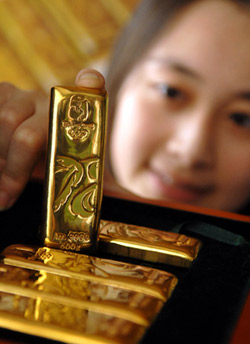Top Biz News
It's a gold rush for more investors this year
By Bao Chang (China Daily)
Updated: 2009-12-07 07:50
|
 |
|
A sales clerk displays a gold bar at Caibai. [Asianewsphoto] |
The man, known only as Mr Huang, now is among many who are ready to become gold investors.
"Purchasing the gold bar is only for an investment. Gold prices are soaring every day, so I don't want to lose such a good opportunity to make money," Huang said.
Gold bars are now so popular that more than 20 investors recently crowded in front of the 1.5-meter gold bar show counter at the Caibai in Beijing.
The popularity reflects the steadily rising value of gold.
The average price of gold in 2008 increased 25.34 percent to $871.57 an ounce, compared with $695.39 an ounce in 2007.
For the fiscal year ended Dec 2, the average price was $950.93 per ounce, and the highest price reached $1,214.80 an ounce, according to www.kitco.com.
Since the financial crisis erupted, more investors and consumers have turned to the stronger value of gold versus investing in a recession-weakened US dollar to diversify their holdings and build wealth.
According to the Gold Demand Trends Report released by the World Gold Council for the third quarter of 2009, the total identifiable global gold demand for the third quarter of this year reached 800.3 tons, or $24.7 billion. Demand was up 15 percent from the second quarter, the report said.
China, which reported 7.7 percent year-on-year growth in the third quarter, reported a 12 percent increase in consumer demand for gold, compared with year-earlier levels, that totaled a record high of 120.2 tons, the report said.
"China is becoming a global leading market in terms of gold supply and demand with its continued strong appetite for gold investment products and jewelry," said Aram Shishmanian, chief executive of the World Gold Council.
Roland Wang, general manager of World Gold Council Greater China, said retail investments account for 18.2 percent of China's total demand for gold in the fiscal year that ended during the third quarter of 2009, up 3.3 percent from the same period of last year.
Demand for 24K gold jewelry is up 81.8 percent, down from 85.1 percent during the same period last year, which reflects a move away from jewelry toward retail investments (including bullion and gold coins), Wang said.
Wang added that China still has the potential to increase its purchases of gold because of the strong economy and other factors.
"Hoarding bullion is still one of the self-protection modes for consumers to preserve wealth," Fan Haibo, a gold analyst at CINDA Security, said.
"Global gold production is about 2,000 tons annually, still scarce," Fan added.
The peak seasons for high gold demand in China are during the Spring Festival holiday and summer months, when there is a strong demand for gold jewelry and accessories.
The World Gold Council reported that gold demand was boosted by the 60th anniversary of the People's Republic of China on Oct 1, when gold commemorative retail items also were available.
However, some consumers have begun to worry about the potential effect of gold speculation.
"The soaring gold market doesn't equal the physical economy's recovery. The gold price is affected by a series of complex factors, which are difficult to control for consumers," said Fu Renjie, an investment manager at a foreign company.
"As an ordinary consumer, it's difficult to estimate or judge the gold price, so I'm conservative regarding gold investment under such turbulent economic conditions," Fu said.













